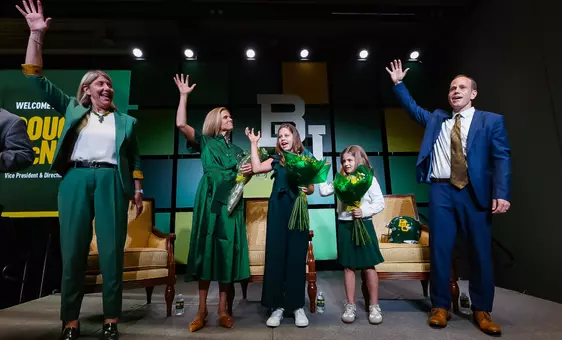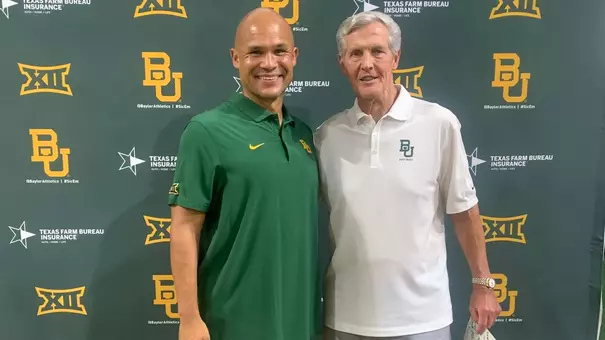Baylor Announces Hall of Fame Class of 2015
8/5/2015 12:00:00 AM | General
The largest Hall of Fame class in school history – along with Wall of Honor recipient Richard F. Hawkins (baseball, 1967-68) – will participate in 2015 on-campus enshrinement activities during Homecoming weekend, Oct. 23-24. In addition to being honored at the Hall of Fame banquet, the 2015 class will be introduced during the Baylor-Iowa State football game on Saturday, Oct. 24 (kickoff TBA) and ride in the school’s annual Homecoming parade prior to the game.
Tickets to the 2015 Baylor Athletic Hall of Fame banquet, which will be held at 6:30 p.m. Friday, Oct. 23, at the Ferrell Center, are $50 each. Tickets may be purchased by contacting the “B” Association at 254-710-3045 or by email at tammy_hardin@baylor.edu. Table sponsorships (seating for 10) are also available for $750 (individual) or $1,000 (corporate).
Organized in 1960, Baylor’s Athletic Hall of Fame recognizes and honors individuals whose participation and contributions have enriched and strengthened the university’s athletics program. Student-athletes are required to wait 10 years after completing their eligibility before being eligible to be considered for this honor. Beginning with the inaugural 1960 class that included coach Floyd “Uncle Jim” Crow and baseball’s Teddy Lyons, 212 honorees have been enshrined in the Hall of Fame, while another 21 have been added to the Wall of Honor since it was started in 2000.
Black completes a rare Hall of Fame trifecta after previously being enshrined at Messmer High School (Milwaukee, Wis.) and Indian Hills Community College (Ottumwa, Iowa). He won two prep state championships and two national championships at the junior college level before coming to Baylor.
A first-team All-Big 12 selection (2001) who was named to Baylor’s All-Centennial Basketball team in 2006, the 6-foot-5 forward led the team in points (15.4), rebounds (8.4) and steals (2.5) per game as a senior in 2001 when the Bears made their first postseason appearance in 13 years. In an 85-77 upset of sixth-ranked Kansas on “Big Monday,” Black had 20 points, six rebounds, four steals and three assists.
The program’s career leader in steals per game (2.55), Black also ranks in the top 10 in career field goal percentage (59.1) and rebounds per game (8.1). After playing pro ball in Europe, he returned to earn his undergraduate degree at Baylor in 2011.
Fifteen years after her playing career ended, Cameron’s name is still all over the school record book. Part of the soccer program’s start-up group in 1996, she ranks second in career goals (67), assists (26), points (160) and shots (351).
A first-team all-region and second-team All-Big 12 pick as a freshman in ’96, Cameron had arguably the best individual season in program history. She had 11 assists and scored a school-record 32 goals, including tallying a record five scores in her collegiate debut.
The former all-state forward from Tulsa (Okla.) Union High School added 13 goals as a sophomore, 11 for the Big 12 championship team in ’98 and 11 more in 2000 after she missed the ’99 season with a knee injury. Cameron was a second-team All-Big 12 pick three times (1996, ’97, 2000) and an honorable mention All-American in ’96.
A three-sport standout who scored over 2,500 career points at Houston (Texas) North Shore High School, Crockrom played a key role in one of the most impressive turnarounds in the history of women’s basketball. Teaming with fellow Hall of Famer Sheila Lambert, she helped the Lady Bears make their first NCAA Tournament appearance (2001) with a 14-game improvement over their last-place finish the year before.
The 6-foot-1 Crockrom averaged a double-double as a junior in 2000-01, pouring in a team-high 21.2 points per game and a Big 12-best 11.6 rebounds to earn first-team All-Big 12 and honorable All-America honors. As a senior, when she repeated those honors, Crockrom averaged 17.7 points and 9.1 rebounds for a team that won 26 games and finished 2nd in the Big 12.
Still ranked in the top 10 in career scoring (15.2) and rebounds (8.4), Crockrom was a first-round WNBA draft pick and selected 11th overall after earning MVP honors at the WBCA All-Star Challenge.
Two-time ITA National Player of the Year (2004-05), Dorsch was part of dominant Baylor tennis teams that had a three-year record of 93-5 and swept the Big 12 regular-season and tournament championships without ever losing to a league opponent. He played at the top of the lineup in singles and doubles for the ’04 team that defeated UCLA, 4-0, for the school’s first national championship in any sport.
The Weiden, Germany, native made a huge splash in his first year at Baylor, setting a school record with 49 singles victories and climbing to a No. 1 national ranking before losing to Illinois’ Amer Delic in the NCAA singles final. He also became the first BU doubles All-American, reaching the quarterfinals with Reiner Neurohr.
After a disappointing first-round exit from the NCAA Tournament as a junior, Dorsch came back in 2005 to defeat San Diego’s Pierrik Ysern in a straight-set final. Ten years later, he still ranks No. 1 in singles winning percentage (.888), fourth in career singles wins (119) and seventh in doubles victories (83).
Kamani, a two-time NCAA champion in the 400-meter hurdles, is tied for sixth in program history with 12 All-America honors. He won the 1999 national title in the event with a meet-record time of 48.63, placed second the next year with a school-record 48.43 clocking and was part of a 1-2 finish as a senior with junior teammate Michael Smith.
Additionally, he ran the second leg on the 4x400 relay team that won the NCAA Outdoor championship in 2000 with a time of 3:01.45 and leadoff leg on relays that won NCAA Indoor titles in 1998 and 2001. That gave him a combined five national championships to go with the three straight Big 12 titles in the 400-meter hurdles.
Running for Panama, Kamani placed fifth in the 400 hurdles at the 2004 Olympics in Athens, Greece, reached the semifinals in 2008 in Beijing, China, and also won gold medals at the South American Championships (2003) and Central American and Caribbean Games (2006).
An all-state quarterback at Class 3A Vernon, Marsh was the Bears’ punter for three years (1968-70) and also started at safety and cornerback on the defensive side. Leading the nation in punting as a junior in 1969, when he was named to the All-Southwest Conference team, he averaged 43.6 yards on 68 kicks and set a school record that stood for 13 years.
Like All-American punter Daniel Sepulveda nearly four decades later, Marsh carried a heavy load for struggling Baylor teams that won just five games in his three varsity seasons. He led the league in punting again as a senior (40.4) and finished with a 41.1-yard average that still ranks in the top 10 all-time.
Before the latest five-year run of quarterback play, Muecke’s 143.55 passing efficiency rating (in 1985) stood as the school standard for a quarter century. Despite splitting snaps with fellow Hall of Fame quarterback Cody Carlson for three years, he threw for 3,799 career yards and 29 touchdowns.
As a freshman in ’82, Muecke had to burn his redshirt seven games into the season when quarterbacks Mike Brannan and David Mangum both went down with injuries. A two-time All-SWC pick, he led the Bears to the Bluebonnet Bowl in 1983 and the Liberty Bowl in ’85, when he was named the Houston Post SWC Most Valuable Player and winner of the SWC/Fort Worth Kiwanis Club Sportsmanship Award.
Part of Grey Cup champions in Winnipeg and Edmonton, Muecke threw for 4,298 yards and 33 TDs in seven seasons in the Canadian Football League. He has spent the last 15 years as an optometrist at the Berkeley Eye Center in Clear Lake, Texas.
Long before winning five PGA Tour events and earning more than $10 million over the past two seasons, Walker was a third-team All-American and the only four-time All-Big 12 pick in the history of the men’s golf program.
The New Braunfels, Texas, native won his first collegiate title at the 1999 Southwest Classic and two more tournaments as a senior, when he posted a 71.89 average and helped the Bears win their only Big 12 championship. Walker still holds career records for lowest stroke average (71.55) and top-five finishes (19) and ranks 2nd in top-10 finishes with 26.
After nine years and 188 starts on the PGA Tour, Walker broke through with a win at the 2013 Frys.com Open. He was part of the U.S. Ryder Cup team in 2014 and is currently ranked 14th in the world and third on in the FedEx Cup standings.
Baylor's Wall of Honor annually recognizes Baylor letterwinners and graduates whose meritorious accomplishments in public or private life following graduation have brought positive public recognition, credit and honor to Baylor and its athletic department.
As Vice President and later CEO-International for Hill’s Pet Nutrition, Hawkins oversaw the economic growth and development of a company that went from $10 million in net sales in 1987 to $500 million in 2003 and expanded distribution to 66 countries outside the U.S.
Transferring to Baylor after lettering in football at Southern Illinois, Hawkins walked on the baseball team and lettered in 1968 before graduating with an MBA in January 1969. He honored his former baseball coach with a $500,000 donation as one of the Founders of Baylor Baseball Park, with half of that going toward the Dutch Schroeder Plaza.
Hawkins and his wife, Peggy, also made a significant “first gift” in helping finance the new “B” Room at McLane Stadium. He served on the “B” Association board for several years and is involved in his home church at Countryside United Methodist in Topeka, Kan.



















